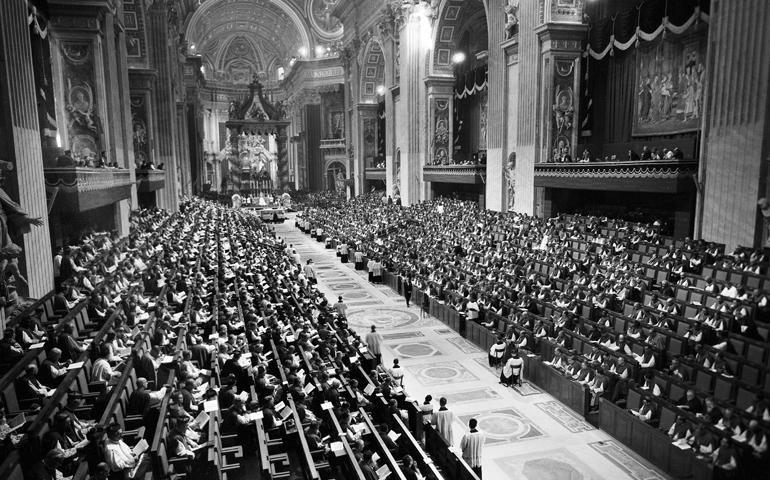
Pope John XXIII leads the opening session of the Second Vatican Council on Oct. 11, 1962, in St. Peter's Basilica. (CNS/L'Osservatore Romano)
"I'm just beginning to understand the depth and breadth of the [Second Vatican] council" and its teachings, says a 91-year-old Jesuit who served as an expert at the council.
Jesuit Fr. Ladislas Orsy, a visiting professor at the Georgetown University Law Center in Washington, told an audience Thursday in Rome that while every ecumenical council in church history led to debate -- and sometimes even schism -- it always has taken more than 50 years for a council's teachings and reforms to take root in the Christian community.
"Granted we may see a great deal of confusion today; granted we may even see a denial of the council or we may even hear a way of explaining away the council," Orsy said during a speech that was part of the Week of Prayer for Christian Unity celebrations at Rome's Centro Pro Unione.
Vatican II can be examined as a historical event, and theologians can use a variety of scholarly tools to propose different interpretations of its teachings, but one thing Catholics cannot deny is the church's teaching that the Holy Spirit is active in its ecumenical councils, he said.
Orsy asked his audience, "Are you surprised that there is a bit of disarray today in the Roman Catholic Church when this happened in the case of Nicea, dealing with the very foundation of our faith?" The Council of Nicea in 325 affirmed the divinity of Christ.
Nicea's deliberations led to debate and division, he said, but over the centuries "this wave of energy" of the Holy Spirit "quietly took possession of the church and the confusion sorted itself out." Today, he said, mainline Christians, while divided on a variety of issues, profess the basic tenets of their faith using the Nicean creed.
"Just looking at what happened after Nicea," he said, "it is not farfetched" to think that the work the Holy Spirit began at the Second Vatican Council continues in the church and "maybe, shall we say, 100 years from now," people will recognize how deeply it impacted the church.
The Jesuit said he hoped to live a "few more years" so he could try to understand more about where the Holy Spirit is leading the church through the teachings of Vatican II and the continuing process of that teaching taking root in the lives of Catholics.
In his talk, Orsy looked particularly at "Dignitatis Humanae," Vatican II's declaration on human dignity and religious freedom.
The Jesuit canon lawyer said the document, approved on the last day of the council, takes the visions of the church, the world and the human person expressed in the other Vatican II documents and applies them to "real-life situations."
It reaffirmed traditional church teaching that all human beings have an obligation to seek the truth and to strive for the perfection to which God calls all people, but it insisted the truth could be imposed on no one.
The document insists on "respect for the truth, but asserts that charity has its own priority, sometimes even above truth," urging the church to model itself more closely after Christ, "who never imposed with any kind of violence the truth that he proclaimed."
The council, he said, articulated a "fresh view of the human person" and affirmed that "by acknowledging the freedom of the human person, we honor a divine quality in the human person," who was created in God's image and likeness.
The declaration, Orsy said, represented a transition from "the realm where the highest criteria for judging the person were abstract, general and impersonal truths to the realm of charity and love, where the normative rule is to honor the dignity of the person."
"The ultimate conclusion is not to enforce the truth, but to embrace the person," he said.